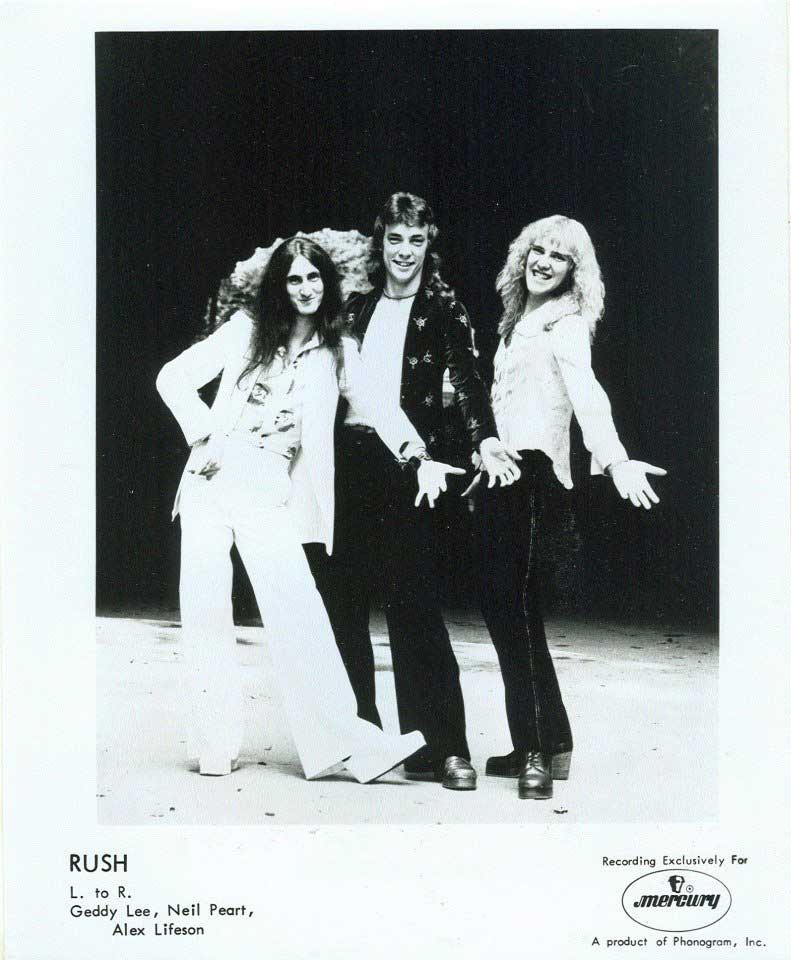Rushing Into Fame
By John Laycock, Windsor Star, January 4, 1975, transcribed by pwrwindows

Just when I thought heavy-metal rock was following the twist and calypso into the attic of forgotten music styles, along come Rush from Toronto to turn the volume back up to 30.
Supposedly, Rush is as outdated as the two-finger peace sign - a standard trio blasting guitar and bass out of a wall of amplifiers around a drummer of huge stamina. No glitter, no medicine-show special effects, no costumes stolen from a 1925 harlot. Just an outpouring of music that can make your gut shudder with the impact of its energy.
Yet it's a mighty lively corpse. They have good prospects to become Canada's next contribution to international rock and toll stardom, following in Bachman-Turner Overdrive's bulky footsteps.
In the five months since they signed with Mercury Records their first album, simply named Rush, has sold 75,000 copies, enough to make a profit on the biggest debut release Mercury has ever known, including BTO.
Since August they've been constantly on the road, quietly - no, inconspicuously - building up a following by playing warm-up for the likes of Kiss and Rory Gallagher, facing audiences that traditionally are indifferent to opening acts, and losing money to boot.
Yet a few weeks ago, when they opened for Kiss at the Michigan Palace, their reception was enthusiastic.
Seeing the audience, I started revising my thinking. The crowd was young, average age about 18, I suppose, the point of compulsive concert-chasing - the only ones who could endure the heat and smoke and crush of the Palace.
This new generation has lived through half a decade of heavy-metal, banged into their heads during the teenage years when tastes are set, and they're no more likely to forget than I would desert Chuck Berry.
The band's not much older - Geddy Lee, bass and vocalist, and Alex Lifeson, guitar, are 20 [sic: 22]; Neil Peart, the drummer, is 21 [sic: 23] - and they listened to the same music, the Cream and Grand Funk Ratlroad and Iron Butterfly. If you take that fact far enough, it at least partially answers the criticism that Rush merely imitates Led Zeppelin.
Geddy quickly grants the influence - they've heard the charge many times, and with some bitterness. "It's only natural," he goes on, "because we were growing up when they were getting established. When we were 14, 15, the big bands were Zeppelin and Jeff Beck. Of course we listened."
Neil expands the answer. "I think the biggest influence on any band is what was big when they were a juke box band - you know, playing the hits. When the Beatles were growing up it was old American rock and roll, and you can still hear it in them. Our biggest handicap is that our influences are still within living memory, some of them still functioning."
Anyhow, a portion of the skepticism is out of date because it's based on the album - and that record is at least a year old now. The band recorded it for their own label, Moon Records, after every major company in Canada turned them down as too heavy. Even the band has changed since then - John Rutsey, the original drummer when the band formed in high school seven years ago, didn't want to travel and was replaced by Neil a week before they went on the road in August.
The next album, which they expect to begin recording this month at Toronto Sound, should be more distinctive, they promise. But it will be a long job - "We haven't much lime to rehearse on the road," Geddy smiles.
"We sit in hotel rooms and try to write heavy metal on an acoustic guitar."
One thing Mercury will be looking for in the new material is a hit single. The company's success with Bachman-Turner was built on Midwest exposure, the same circuit Rush has been following - but also on CKLW-AM, eager for Canadian content, booming the hit sounds into the States. (In a recent trade-magazine advertisement, the station culled itself the "Canadian pipeline".)
The three men of Rush are as quiet off-stage as they are loud on - and unusually well-spoken and analytical, too.
They know they are in a business. But they all agree they aren't out to get rich quick - just to be successful playing what they want to.
Which means, practically, working in the United States. Geddy figures Canada represents only 7 and 1/2 per cent of the record market, and follows American and British trends anyhow - heavy bands can only get played on FM stations to gain recognition, and Canada has barely a half-dose... about the same as Detroit alone.
So far, the signs are good Alex says, with genuine surprise, "You know, we thought it would take a tour to get as far as we have in five months."